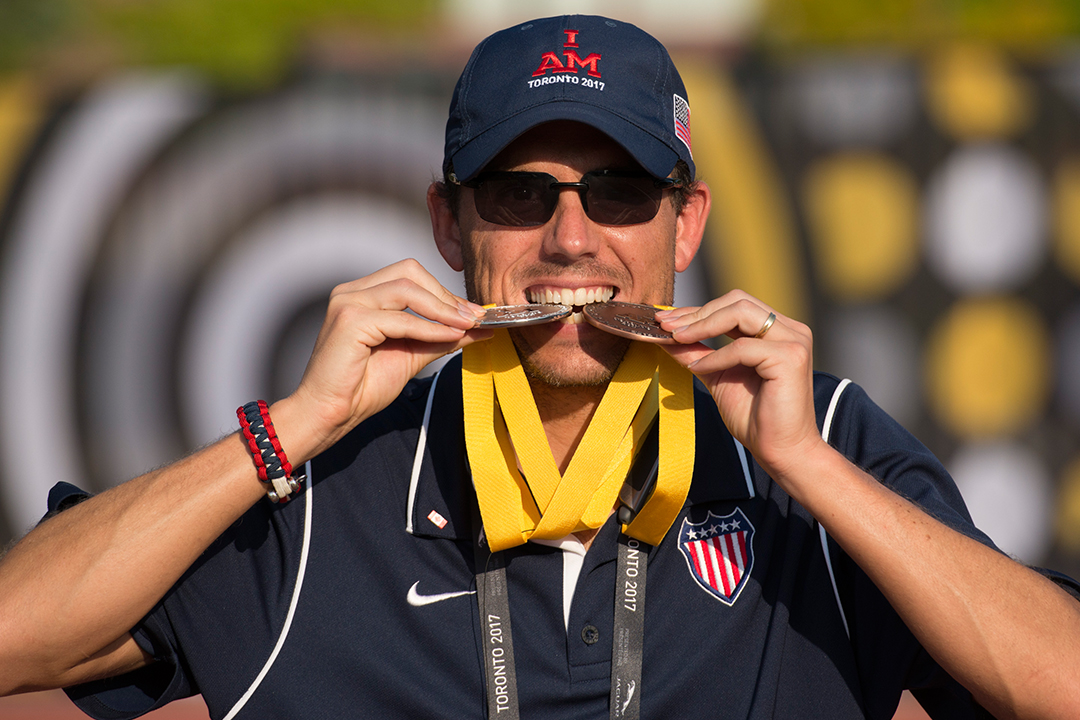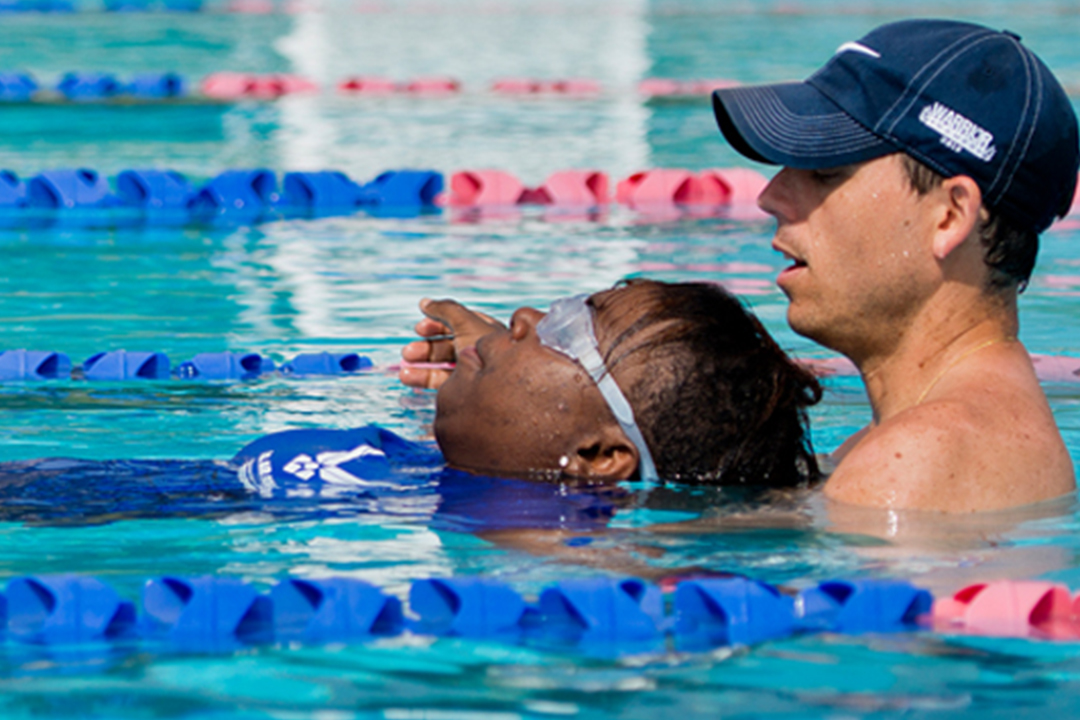At the Toronto opening ceremonies of the 2017 Invictus Games, with dignitaries like Britain's Prince Harry and former president Barack Obama looking on, USA Head Coach and Columbian College alumnus Aaron Moffett, BA ’99, took a moment to survey his team of athletes. They included a world record-holding Navy swimmer who lost both his eyes when he stepped on an IED in Afghanistan; a one-armed archer whose Air Force squad was ambushed by a terrorist cell in Indonesia; a wheelchair cyclist who, after years of serving as linguist for the Air Force, developed debilitating multiple sclerosis; and a veteran servicewoman who found a measure of peace in the pool after struggling with the effects of a sexual assault.
“These wounded warriors are overwhelmingly resilient, incredible people who are dedicated to their country,” Moffett said. “I am privileged to be even a small part of their recovery.”
A sports competition for wounded, ill or injured veterans, the Invictus Games welcomed more than 500 athletes from 17 different countries this summer. They competed in events such as swimming, cycling and wheelchair basketball and tennis. For Moffett, the games offered an opportunity to combine the skills he honed as a psychology major with his passion for athletics and service.
Moffett first began working with disabled athletes as a competitive swimmer at GW. In addition to offering lessons to professors and their families, he volunteered to help deaf children gain confidence in the pool. After earning his PhD in kinesiology at Michigan State University, Moffett went on to create a nationally-recognized Paralympic-style tournament called the DisAbility Sports Festival while he was an associate professor at Cal State San Bernardino. Since 2014, he’s coached servicemen and women as a sports psychology consultant for the Air Force Wounded Warrior program and, in 2016, was named the head coach for Team USA at the Invictus Games. This year, Moffett managed 100 U.S. athletes who took home a tournament-high 139 medals in Toronto.
“The Invictus Games lets our athletes show that they are not defined by their wounds,” he said. “They have productive and fulfilling lives ahead of them. And sometimes those lives begin with the starting gun.”
Back Into Blue
For Moffett, coaching adaptive sports is as much about teaching life skills—such as coping, socialization and goal setting—as athletic techniques. Many of his trainees suffer not only from physical disabilities but also what he calls the “invisible wounds” of combat and illness. Too many of his soldier-athletes saw their military career plans derailed by everything from mortar fire to post-traumatic stress disorder to an unexpected doctor’s diagnosis. “Some are dealing with issues of resentment, others have feelings of low self-worth,” he explained.
Moffett uses the pool and the track as classrooms for instilling confidence and renewed purpose. Something as simple as putting on a blue Team USA uniform can show veterans that there’s still a place for them within the military. “We want to bring them back into the family—back into blue, as we call it,” he said.

Moffett managed 100 U.S. athletes who took home a tournament-high 139 medals at the 2017 Invictus Games in Toronto.
Moffett relies on a staff of professional coaches to help athletes adapt their skills to sports that go beyond swimming, like power lifting and sitting volleyball. Because team members live in various locations throughout the country, his staff do much of their instruction by phone, e-mail, Facebook and a team app that enables them to manage workouts and coordinate training regimens. Some of the Invictus athletes they coach are world-class contenders—like Navy Lt. Brad Snyder who has two prosthetic eyes and has won swimming medals at events around the world. But many others haven’t donned a pair of swim trunks or ridden a bicycle since their high school days. “We take a lot of our wounded warriors off the couch and help them become international-caliber athletes,” Moffett said.
For Moffett, there is little difference between coaching Invictus athletes and training people without disabilities. Crediting his GW psychology studies for teaching him to focus on competitors as individuals, his coaching methods vary for each team member. “But I can be tough on all of them,” he laughed, noting that many of his athletes don’t want to be treated with kid gloves. Still the rules and techniques of adaptive sports programs can be hard to master. The wounded Air Force archer, who lost his right arm below his elbow in Indonesia, learned to pull a bow string with his teeth. Swimmers with various degrees of sightlessness wear blackened goggles to level the playing field. They keep track of their stroke counts to gauge when they are approaching the pool wall. (Long poles are also used to gently tap the swimmers as they near the end of the pool.)
Moffett tallies the team’s successes not by medals but by the number of athletes who mentor other service-people. “You really feel the team comradery when you see these wounded warriors giving back to their fellow brothers and sisters,” he said. At every finish line, he was moved by inspirational moments, such as an Air Force linguist giving her recumbent cycling medal to a struggling teammate. The most memorable moment for Moffett happened at the U.S. Department of Defense’s Warrior Games. There he received a warm embrace from a veteran who was dealing with the aftermath of sexual trauma—a giant step forward for a person who had resisted physical contact.
“We have a saying that you need eight hugs a day to survive, but you need 12 a day to thrive,” Moffett said. “We put a lot of meaning into every single wounded warrior and every single hug.”


